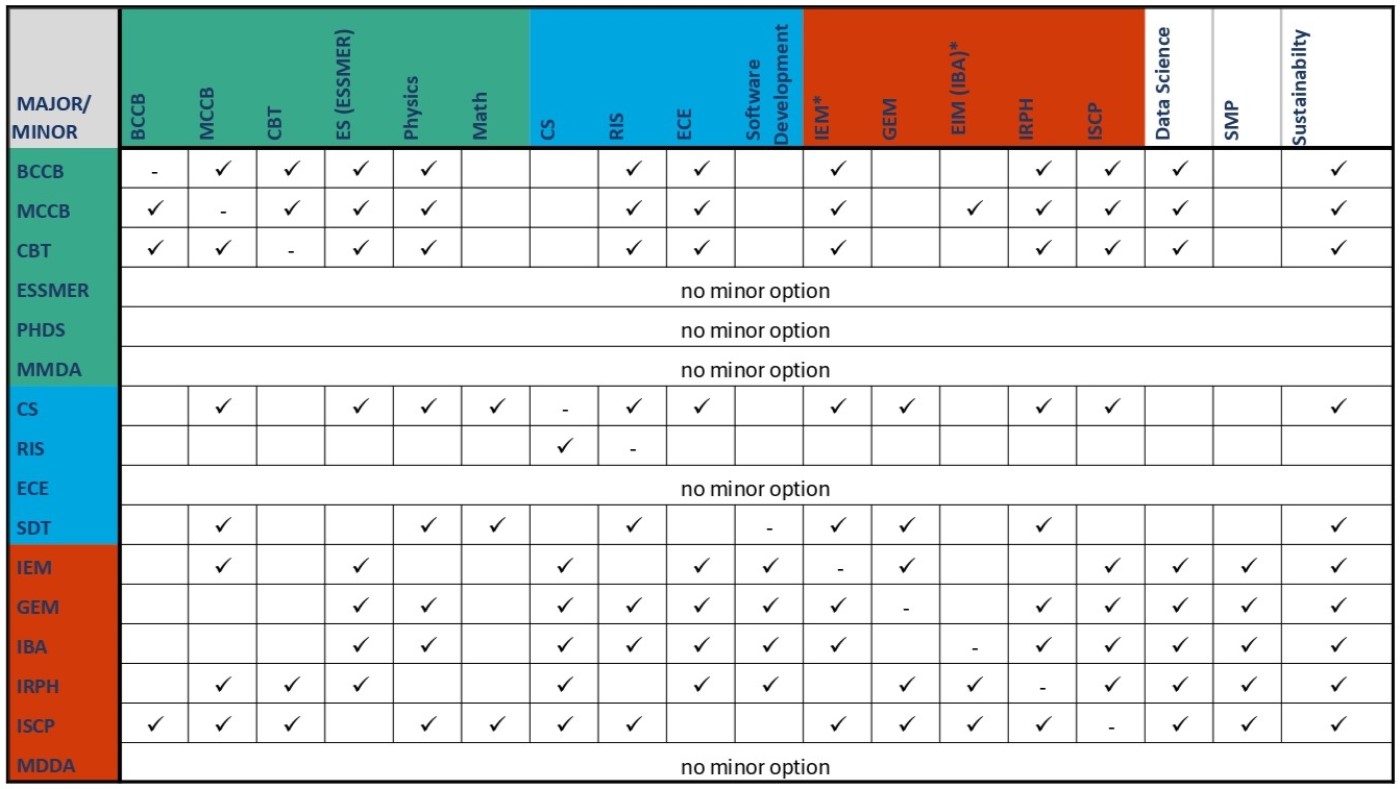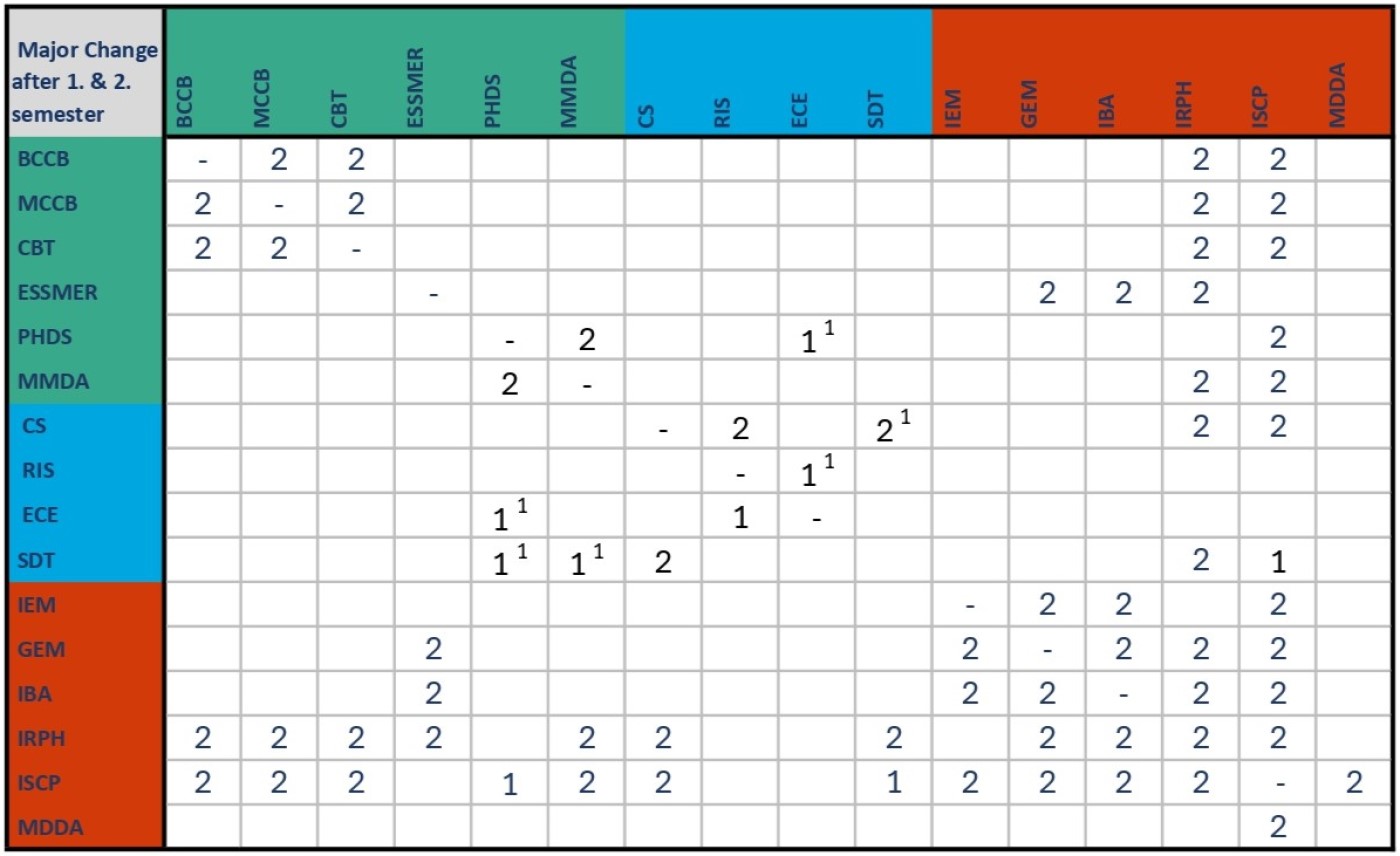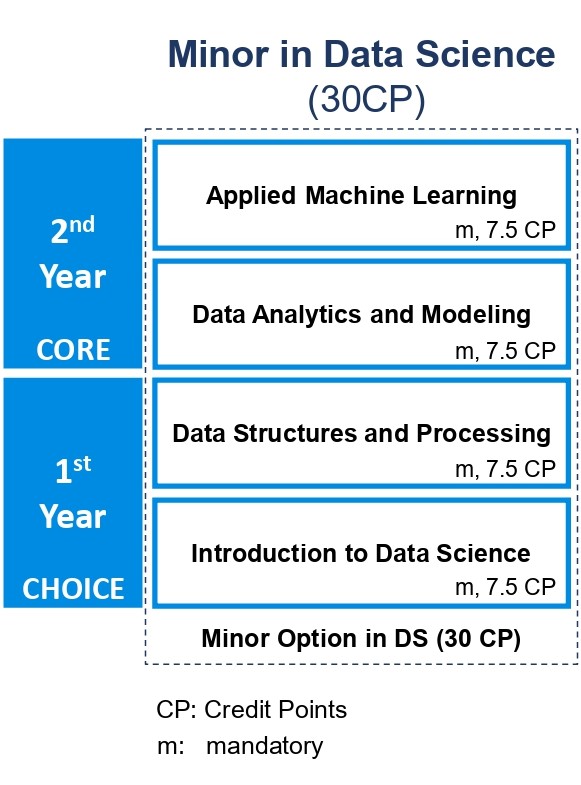

In general, Bachelor study programs at Constructor University Bremen, are eligible for a major as well as a minor. A “minor” is a study track in a second discipline other than the major within the 180 CP required for a bachelor’s degree.
The educational aims of a minor are to broaden the students’ knowledge and skills, support the critical reflection of statements in complex contexts, foster an interdisciplinary approach to problem-solving, and to develop an individual academic and professional profile in line with students’ strengths and interests. The cross-qualification obtained through a major/minor combination has proven beneficial for enhancing the career options of students. The extra qualification “Minor” will be highlighted in the transcript.
Possible major/minor combinations can be found in the study handbooks of the major study programs.
The Undergraduate Study Program Portfolio

* online students can only take online minors
BCCB (Biochemistry and Cell Biology) | MCCB (Medicinal Chemistry and Chemical Biology) | CBT (Chemistry and Biotechnology) | ESSMER (Earth Sciences and Sustainable Management of Environmental Resources) | PHDS (Physics and Data Science) | MMDA (Mathematics, Modeling and Data Analytics) | CS (Computer Science) | RIS (Robotics and Intelligent Systems) | ECE (Electrical and Computer Engineering) | SDT (Software, Data and Technology) | IEM (Industrial Engineering and Management ) | GEM (Global Economics and Management) | IBA (International Business Administration) | IRPH (International Relations: Politics and History) | ISCP (Integrated Social and Cognitive Psychology) | SMP (Society, Media, and Politics)

1: major has to be changed after one semester 2: major can still be changed after 2 semesters.
1 approval by faculty required
The Minor in Sustainability is an undergraduate interdisciplinary program that equips students with the knowledge, tools, and mindset to address complex environmental, social, and economic challenges. Delivered fully online and asynchronously, it provides flexibility while offering both a strong theoretical foundation and practical approaches to sustainability. The program complements any major which allows a minor, preparing students to contribute to sustainable development in diverse professional and academic contexts.
Description:
Concept of the Minor in Sustainability:
As global concerns around climate change, biodiversity loss, resource depletion, economic and political instabilities, and social equity continue to grow, the need for sustainability literate graduates across all fields becomes increasingly important. The Sustainability Minor is an interdisciplinary academic program designed to equip students with the knowledge, tools, and mindset needed to address complex environmental, social, and economic challenges. This minor provides both a foundational understanding and practical approaches to sustainability, complementing any major, whether in the sciences, engineering, business, social sciences, or humanities. The asynchronous online format of the program makes it accessible to students from all Constructor University bachelor programs, except for those that do not include a minor track in their curriculum or support only specific minor subjects.
Special features / USPs:
The Sustainability Minor at Constructor University offers a unique academic experience tailored for students to grasp the concept of sustainability. The program emphasizes both theoretical and practical aspects of sustainability, preparing students not only to understand sustainability challenges but also to develop innovative, actionable solutions. Its fully asynchronous online format allows students to engage with the material at their own pace, regardless of their major or timetable. The program is designed to be highly interdisciplinary, drawing on diverse areas of expertise to provide students with a well-balanced and integrated perspective. Constructor University’s international learning environment further enriches discussions on global sustainability issues, exposing students to diverse viewpoints and real-world case studies from around the world. The asynchronous nature of the program is supported by learning materials presented in an innovative, informative, and engaging manner, combining recorded lectures, interactive videos, reading materials, quizzes, games, and tutorials.
Target group:
The Minor in Sustainability is designed to be relevant for undergraduate students who want to integrate sustainability into their field-specific expertise. There are no specific prerequisites. The program is open for all Bachelor students in all programs, except for those programs excluding a minor track in their curricular structure or supporting only specific minor subjects.
Qualification aims:
The EU's higher education policy on sustainability focuses on integrating sustainability into all aspects of education and research. In this context, the Sustainability Minor aims to equip students from all disciplines with a foundational understanding of sustainability principles and the skills needed to critically engage with real-world environmental, economic, and social challenges. Graduates will be aware of global sustainability issues and prepared to become responsible, informed, and proactive contributors to sustainable development. They will be well-prepared for a thriving job market and for pursuing postgraduate studies in many growing fields related to sustainability. Particular attention is paid to the following components:
- Theoretical Background: Core Concepts of Sustainability
- Systems and Life Cycle Thinking
- Practical Frameworks
- Assessing Sustainability Performance
Program duration:
Four semesters.
ECTS points:
30 ECTS
Starting date:
Fall 2025
Business and technology in digitally transforming societies generate massive amounts of data that require specific skills to process, display, analyze, and interpret the underlying information.
At Constructor University, data competence is developed as an additional qualification through a Minor in Data Science, which is offered to students from almost all Bachelor programs. Topics include the data analysis pipeline and essential data operations, societal and legal implications of data science and digitization, business and career opportunities, fundamentals of computer science and key mathematical principles.
Using a practice-oriented learning approach through hands-on computational exercises in Python and building on case studies and real-world applications, students will develop relevant data competencies that are linkable to their major study program.
Description
Concept of the Minor in Data Science:
Digitally transforming and data-driven societies reveal novel opportunities and challenges that are only partially acknowledged in disciplinary study programs. The Minor in Data Science at Constructor University puts inter-disciplinarity, diversity, and an internationally shared expert knowledge and understanding into action. Our students obtain a solid foundation in this emerging field, covering both technical and non-technical aspects. With an emphasis on online and asynchronous learning, the Minor in Data Science is open to students from almost all Constructor University Bachelor programs.
Special features / USPs:
The small campus of Constructor University with its broad spectrum of disciplines including Social Sciences, Natural Sciences, Engineering and Computer Science provides ample opportunities for collaborative and interdisciplinary data-driven projects. The Minor in Data Science offers students a natural route to the in-house graduate programs Data Engineering (DE) and Data Science for Society and Business (DSSB). By advancing the cooperation of Constructor University with partners from academia, industry and business, Data Science opens new opportunities for our students.
Asynchronous learning is promoted through online and hybrid course formats in order to manage individual preferences and heterogeneous expertise. Theory and applications are integrated in courses combining lectures with practical tutorials and research projects in order to deepen an understanding through immersion. An innovative teaching approach switches flexibly between these formats and tailors education towards a personalized experience.
Target group:
The Minor in Data Science is targeted towards students of all areas interested in quantitative scientific analysis, interpretation, and decision-making. There are no explicit prerequisites but a sound foundation in Mathematics is helpful. Full synergy within the minor option for all Bachelor students in all programs, except for those programs excluding a minor track in their curricular structure, or supporting only specific minor subjects (presently IEM, ECE, and RIS).
Qualification aims:
The Minor in Data Science offers additional interdisciplinary qualification and training in universally applied digital skills for undergraduate students from almost all majors. Students graduating with a Minor in Data Science are well prepared for opportunities on a thriving job market or to successfully pursue their academic studies in many dynamically growing research fields.
Program duration:
Four semesters.
ECTS points:
30 ECTS
Starting date:
Fall 2022
3C Structure with a Minor in Data Science:

The undergraduate minor program society, media and politics (SMP) integrates the social sciences that are necessary to tackle the key challenges of our globalized world in a digitized context. Our students are leaders of tomorrow who want to learn to make a difference, students who want to understand societal problems, think about possible political solutions and learn how to use media to instigate change. We prepare students to apply an interdisciplinary perspective in real life problem solving as well as making use of the acquired media skills in professional contexts.
Description
Sociology, media studies and political science are learned from a problem-solving, and student-centered perspective. The minor empowers students to get hands-on practical experience with media, social intervention or academic research. Students are empowered to address issues in their environment by applying their knowledge and skills in direct practice. They learn about their social environment on field excursions, discuss political conditions and possible solutions to social issues, and learn to campaign for their initiatives with the skillful use of digital media, for example by producing their own videos or animations. Innovative forms of assessment allow them to integrate these forms of activity in their curriculum.
Students minoring in SMP are offered the unique opportunity to acquire a broad spectrum of media skills. They are professionally guided by our media team and provided with the necessary technical equipment by our SMP Media Center. All basic equipment for media projects, be they video, VR or animation, graphic design, creative writing or podcasts, are accessible to our students at the SMP Media Center.
Concept of the Minor in Society, Media and Politics:
A solid basic training in the disciplines involved and an intense immersion in both quantitative and qualitative methods enable students to get a hands-on experience with scientific empirical analysis in research oriented seminars. Moreover, the SMP Media Center supports students’ initiatives to develop creative skills in digital media, be that the creation of videos, animations, podcasts, vlogs, or blogs. The Media Center will supply them with the professional advice and equipment that they need, and the study program broadly supports media projects (media products) as an actual form of assessment, so that students with an SMP minor have the opportunity to develop practical media skills.
Special features / USPs:
The SMP minor contributes to becoming socially responsible leaders because they have strong critical faculties, are trained to address societal issues in a global and digital context and are skilled problem solvers, proficient at thinking through problems from varying disciplinary perspectives. The disciplinary training equips them with the tools that are most relevant in this context. Studying SMP as a minor opens career opportunities in the media, non-governmental organizations, public administration, community development, international aid agencies, international businesses, the cultural sector, international youth and social work, fundraising and many other areas.
Our experience shows that graduates from the SMP major have built successful careers in start-ups and NGOs as well as in large companies; they have moved on to the most renowned academic institutions in the world, some of them are developing impressive careers in academia, while others have started their own companies. We are convinced that the SMP minor contributes to successful careers because creative problem solving, the ability to judge from a broader perspective and the ability to think out of the box are faculties that are in very high demand in all positions of leadership.
Target group:
The SMP minor adds a valuable education track to a variety of majors. For example, for the ISCP major SMP adds a perspective on the broader societal context, while for IRPH students, it adds a focus on more contemporary issues to the broad historical and global perspectives. GEM and IBA students with a stronger sense of social responsibility or some interest in social entrepreneurship will find SMP to be a valuable complement to their studies. Students of the School of Science or the School of Computer Science and Engineering programs can hugely benefit from minoring in SMP as well.
The risks and opportunities of technology are growing exponentially – and, with them, the political debate on their regulation is increasingly acute. At the same time, the need for mediatized and visualized communication of science and technology has become a crucial point of urgently needed qualification on all labor markets. Minoring in SMP therefore is of special interest for those students who are interested in the societal implications, opportunities and risks of the technologies they work with, for students who care about the political framework and regulations or the societal consequences of their disciplines, as well as for students who want to embrace the immense power of mediatization and visualization of science and technologies in their professional and academic future.
Qualification aims:
The minor SMP is interdisciplinary and provides critical knowledge of sociology, media studies and political science. Its focus lies on contemporary societal, media, and political issues and to address these issues practically, be it at a global or a local level. Learning is research- and problem-oriented. Students are encouraged and empowered to apply the skills and knowledge they have acquired in the practical context of research and/or social issues. If they so wish, they can also acquire practical media skills by developing actual media products, by using the equipment with the professional support of the staff at the SMP Media Center. The SMP minor is designed similar to very 5 successful other programs, such as Sozialwissenschaften - "Medien, Politik, Gesellschaft" at the Heinrich-Heine-University Düsseldorf.
Program duration:
Four semesters.
ECTS points:
30 ECTS
Starting date:
Fall 2023